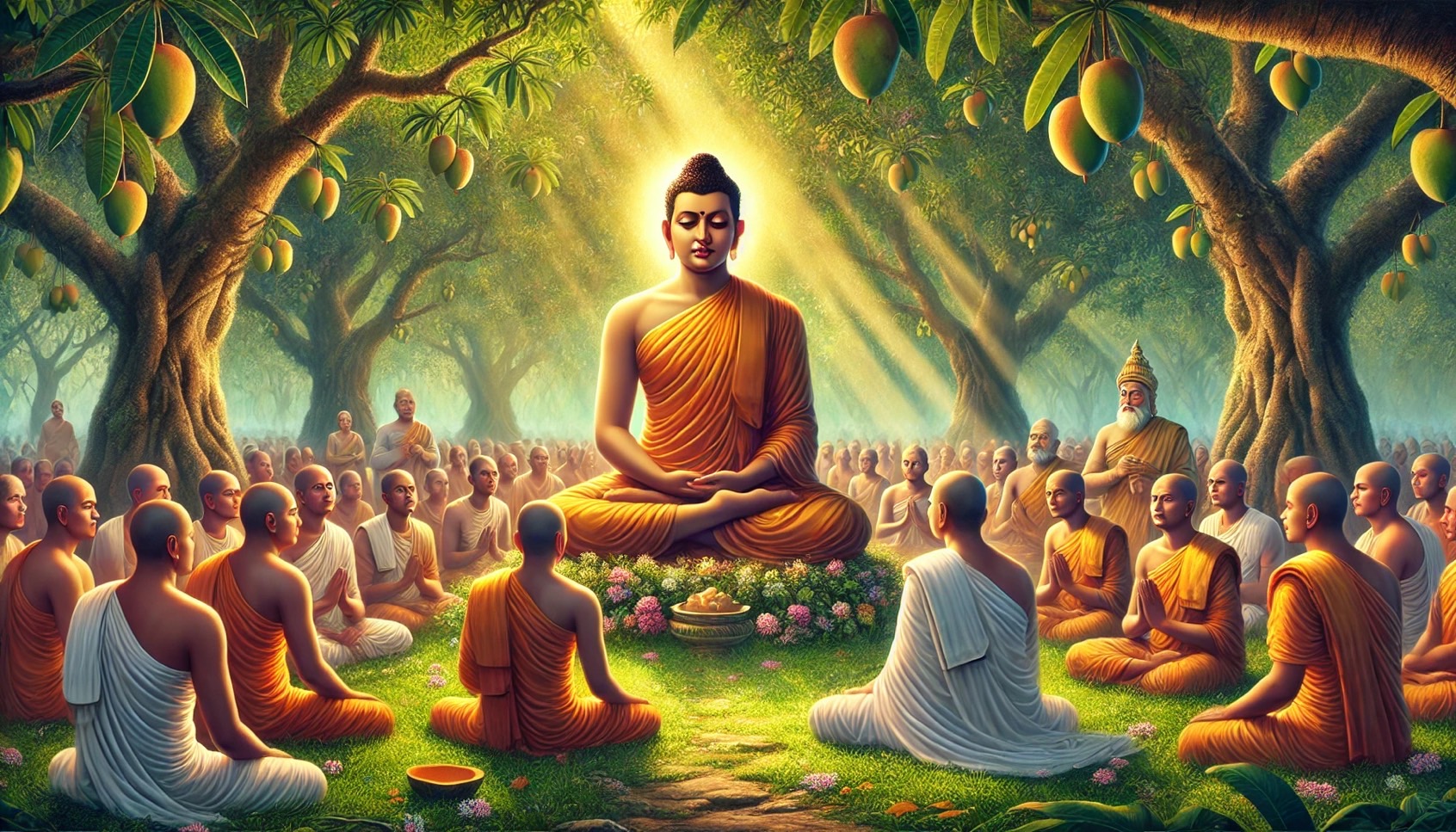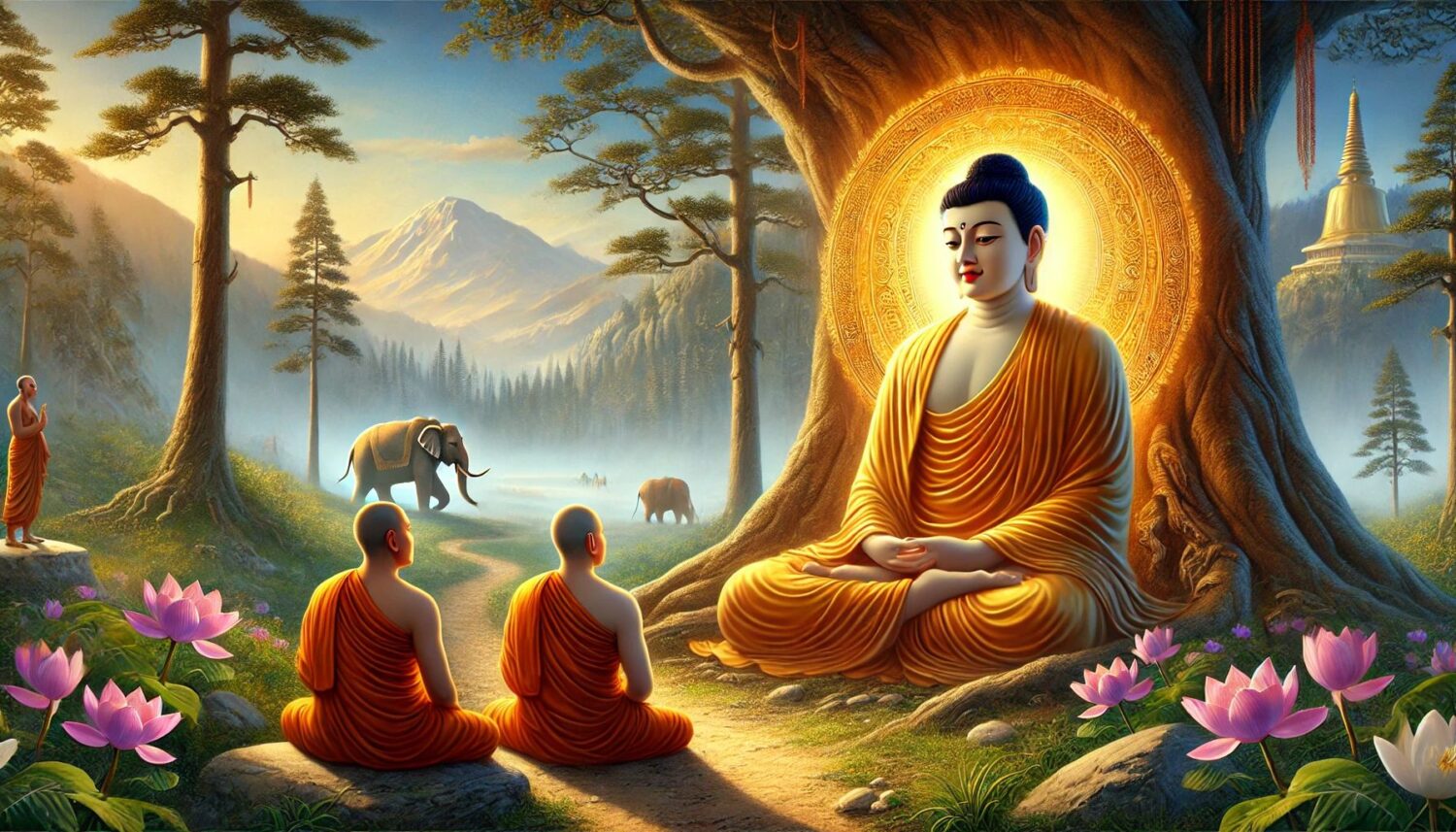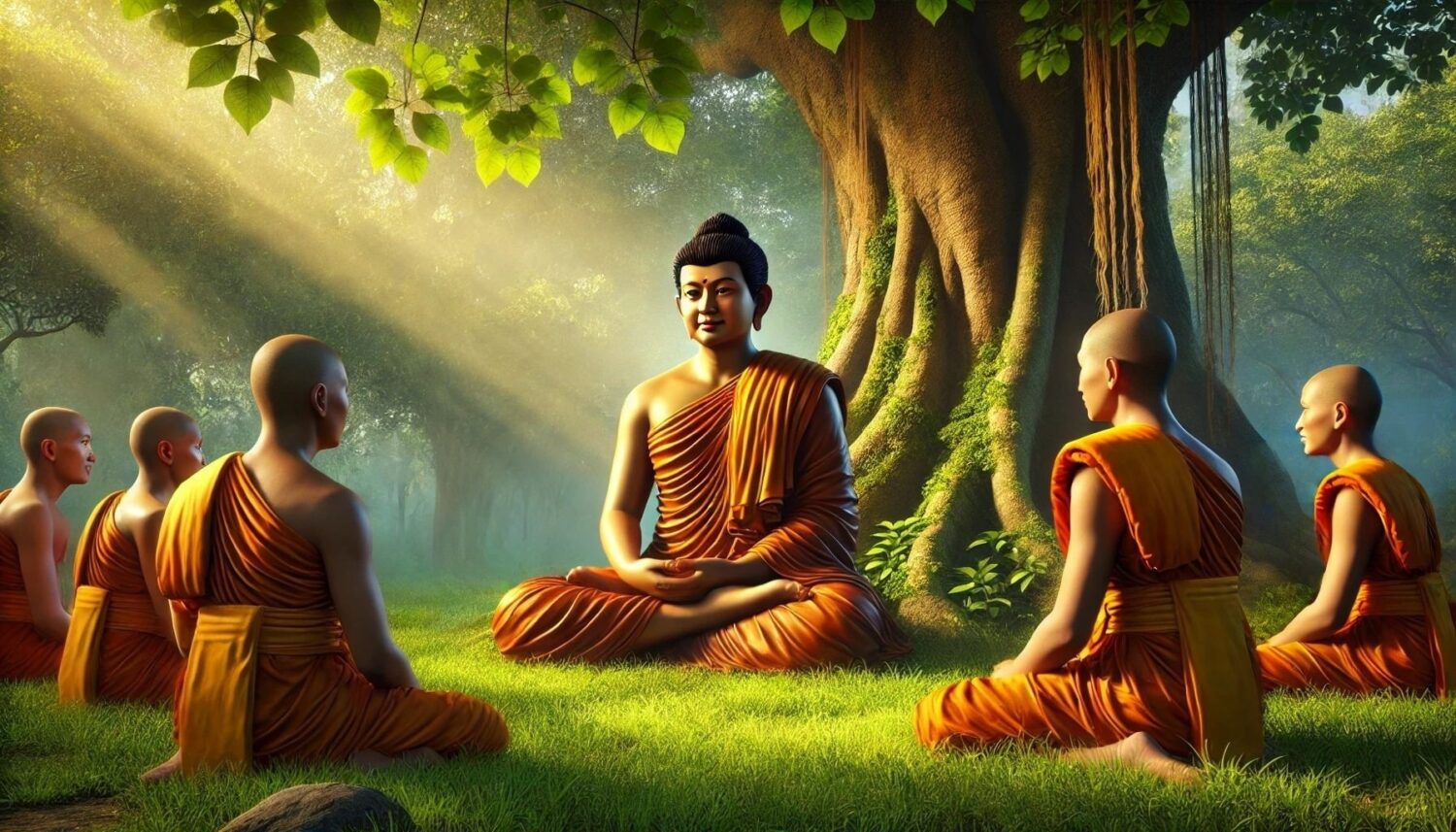
Date: 11/30/2024 12/01/2024
Location: Star Lake Meditation Center
Teacher: Otto Huang
Dharma Talk
Mental Misconductis the Heaviest – The Conversion of the Layman Upali
Once, the Buddha traveled to Nalanda in the kingdom of Magadha and stayed in a mango grove near the town of Pavarika.
At the time, the Jain teacher Nigantha was also residing in Nalanda with his disciples.
Among Nigantha’s disciples was a tall man, nicknamed “Long Ascetic” because of his height.
One day, Long Ascetic, after begging for food in Nalanda, visited the Buddha. The Buddha asked him about Nigantha’s teachings on karma, to which Long Ascetic replied:
“Gautama! My teacher, Nigantha, doesn’t discuss karma in the same way. Instead, he teaches three forms of punishment: bodily punishment, verbal punishment, and mental punishment. He says these three are different, with bodily punishment being the heaviest and mental punishment the lightest.”
The Buddha, after several questions and receiving the same answers, fell silent.
Long Ascetic, noticing the Buddha’s silence, posed the same question back to him.
The Buddha replied:
“Ascetic, I do not teach punishment but focus on avoiding the three unwholesome actions: bodily misconduct, verbal misconduct, and mental misconduct. Of these, I teach that mental misconduct is the heaviest.”
Long Ascetic repeated his position, and the Buddha confirmed his own view that mental misconduct is the most serious.
Seeing no agreement, Long Ascetic took his leave.
After Long Ascetic returned, Nigantha learned that he had steadfastly upheld their beliefs in front of the Buddha and praised him. While Nigantha was praising Long Ascetic, a large group of Nigantha’s lay followers, including their leader Upali, boasted that he could easily refute the Buddha’s views and requested permission from Nigantha to debate with the Buddha. Long Ascetic repeatedly opposed the idea, saying:
“Master! I don’t want Upali to go to the ascetic Gautama, as the ascetic Gautama possesses magical powers and spells that can enchant others into becoming his disciples. I fear that if Upali goes there, he may be swayed and become his disciple.”
Nigantha, however, confidently replied:
“That’s impossible, Long Ascetic! Only Upali could possibly turn Gautama into his disciple, not the other way around! Go quickly, Upali! Go subdue the ascetic Gautama. If I can subdue him, so can you!”
Thus, Upali went to debate with the Buddha.
He first confirmed the discussion that the Buddha had with Long Ascetic, and then he praised Long Ascetic’s arguments. After listening, the Buddha said to Upali:
“Layman, if you are willing to engage in this discussion based on the pursuit of truth, then we can explore this matter deeply.”
Upali agreed, and the Buddha began by asking:
“Layman, if a Jain disciple vows to drink only hot water and not cold water, to avoid killing unseen beings in the water, but then falls seriously ill and needs cold water for treatment, though he desires it, he restrains himself and dies without drinking it. Where, according to Nigantha’s teachings, would he be reborn?”
“Gautama, he would be reborn in the heavenly realm called ‘Heaven of Attached Intentions’ because he died with an impure attachment to the desire for cold water.”
“Layman, layman, pay attention to your answer. You have contradicted yourself! You agreed to pursue this matter on the basis of truth.”
“Gautama, though it is as you say, I still believe bodily punishment is the heaviest, and mental punishment is the lightest.”
“Very well, layman. Let me ask you another question: if a Jain disciple, to avoid killing, strictly follows certain prohibitions, and in doing so, he inadvertently treads on and kills many tiny creatures. What kind of consequences, according to Nigantha, would he face?”
“Gautama, if it wasn’t intentional, Nigantha doesn’t consider it a serious offense.”
“Layman, this ‘intentionality’ you mentioned—what kind of punishment does Nigantha attribute it to?”
“Gautama, that is considered mental punishment.”
“Layman, layman, pay attention to your answer. You have contradicted yourself! You agreed to pursue this matter on the basis of truth.”
“Gautama, though it is as you say, I still believe bodily punishment is the heaviest, and mental punishment is the lightest.”
“Very well, layman. Let me ask you another question: if someone wanted to kill every person in this city with a knife in a single day, could he succeed?”
“Impossible! Nalanda is so wealthy and populous; no one could kill everyone in a single day with a knife.”
“Layman, if a mendicant or Brahmin with great supernatural powers wished, by a single thought, to destroy the entire city of Nalanda, would that be possible?”
“Gautama, it would be possible. Not only could they destroy one city, but even ten, thirty, or fifty cities.”
“Layman, layman, pay attention to your answer. You have contradicted yourself! You agreed to pursue this matter on the basis of truth.”
“Gautama, though it is as you say, I still believe bodily punishment is the heaviest, and mental punishment is the lightest.”
“Very well, layman. Have you heard of mountains like Danta, Kalinga, Misha, and Matanga being turned into desolate forests?”
“Gautama, I have heard that these were desolated by the anger in the minds of ancient seers.”
“Layman, layman, pay attention to your answer. You have contradicted yourself! You agreed to pursue this matter on the basis of truth.”
Upali reflected for a moment and said to the Buddha:
“Gautama, I have been deceived and misguided by the ignorant Nigantha for a long time, which led me to assert that bodily punishment is the heaviest. Blessed One, I now understand. From now on, I take refuge in the Buddha, Dharma, and Sangha. May the Blessed One accept me as a lay disciple, to whom I pledge lifelong devotion until the end of my days.”
“Layman, silently take refuge. There is no need to announce it.”
“Blessed One, what you said makes me admire and rejoice even more. When I was a follower of Nigantha, they would proclaim it all over Nalanda, which is so different from what you do, Blessed One.
Blessed One, from this day forward, I will no longer allow Nigantha or his followers to enter my home. Only you and your four-fold assembly—bhikkhus, bhikkhunis, laymen, and laywomen—are welcome.”
“Layman, you have long respected and supported Nigantha and his followers, providing them with sustenance. In the future, if they come to your home, you should continue to offer them food.”
“Blessed One, what you said makes me admire and rejoice even more. In the past, I heard people say that you instructed your followers to give alms only to you and your disciples, not to others, and that giving to you brought great merit, while giving to others brought none. Yet now you encourage me to continue giving alms to the Jain followers. Blessed One, regarding this matter, I will handle it appropriately. Blessed One, let me once again take refuge in the Buddha, Dharma, and Sangha, to whom I pledge lifelong devotion until the end of my days.”
The Buddha then systematically instructed Upali on various teachings: he began by using skillful means to arouse joy and willingness in Upali to learn. Then he taught him about giving, morality, and the path to heavenly rebirth, as well as explaining the dangers of the five desires, the defilements of birth and death, the merits of renunciation, and the pure path of practicing the Dharma. Upali developed a heart filled with joy, pliancy, patience, aspiration, concentration, clarity, and a pure mind, like a white cloth ready to be dyed. Finally, the Buddha taught him the Four Noble Truths of suffering, origin, cessation, and path.
At that moment, Upali attained the vision of the Dharma, free from impurities and attained the first fruit of awakening. He saw, understood, and entered the path of the Dharma without doubts or fear. Upali folded his hands and said to the Buddha:
“Blessed One, I now understand. Let me, for the third time, take refuge in the Buddha, Dharma, and Sangha, to whom I pledge lifelong devotion until the end of my days.”
Upon returning home, Upali instructed his doorkeeper to only allow the Buddha and his four-fold assembly to enter and no longer allow Nigantha and his followers into his home.
Upon hearing this, Long Ascetic returned to Nigantha, lamenting why he hadn’t listened to his advice, which had led Upali to debate with the Buddha. Nigantha, disbelieving him, sent Long Ascetic directly to Upali’s home to verify. Upon arrival, the doorkeeper was willing to offer him food but would not allow him entry. Long Ascetic, disappointed, returned to complain again, but Nigantha was still skeptical and decided to go himself with his followers to see for himself.
The doorkeeper told Nigantha that Upali had become a disciple of the Buddha, and if they needed food, they could wait outside but were not permitted entry. Nigantha insisted that he only wanted to see Upali face-to-face for an explanation.
Upali arranged seats in a side room and took the highest, most honored seat himself. Nigantha, displeased, questioned him:
“Layman, you sit in the honored position like a mendicant. Is this proper?”
“Sir, there are plenty of seats. Please find one yourself.”
“Layman, you are arrogant and foolish! How could you boast that you would debate Gautama and then be enchanted by his magic, surrendering to him? How could this happen?”
“Sir, Gautama’s magic is auspicious and benevolent. If my friends and relatives could be transformed by it, they would gain benefits and happiness. If all beings—including kings, Brahmins, Vaisyas, Shudras, as well as heavenly beings, demons, and Brahmas—could be transformed by this magic, they too would gain benefits and happiness.
Let me give you a metaphor: A Brahmin husband, loving his young wife, buys a monkey at her request. She dislikes the monkey’s color and wants to dye it gold, but the dyer says the monkey’s dark fur cannot be dyed gold. Sir, your teachings are like that—they can’t withstand questioning and can’t be verified through contemplative practice. They can only attract ignorant people, not the wise.
Now, imagine a Brahmin with a new white cloth to dye gold. The dyer says this new white cloth will take a beautiful, bright gold color. Sir, the teachings of the Blessed One, the Fully Enlightened One, are like that. They can withstand questioning and can be verified through contemplative practice, but only those with wisdom can be dyed; the ignorant cannot.”
“Noble layman, everyone, including the king, knows that you are my disciple. Who do you consider yourself a disciple of?” Nigantha asked again.
At that moment, Upali rose, turned towards the Buddha, placed his palms together, knelt on his right knee, and offered a long praise to the Buddha, clearly declaring himself as the Buddha’s disciple.
Upon hearing this, Nigantha was so shocked that he spat blood. Soon after, while traveling to Pava, he passed away from this blow.

